Consumer Behavior and Technology Impact in the Hospitality Industry
VerifiedAdded on 2023/01/10
|15
|4608
|82
Report
AI Summary
This report provides a comprehensive analysis of hospitality consumer behaviour, focusing on factors influencing consumer attitudes and decisions within the context of the Intercontinental Hotel Group. It examines the impact of digital technology on changing consumer trends and its effects on the hospitality industry, including changes in customer behaviour, expectations, and information accessibility. The report delves into the stages of consumer decision-making, creating a map for purchasing hospitality services and highlighting the significance of this mapping for marketers. It compares the decision-making processes of B2C and B2B customers, evaluates various market research approaches, and assesses the impact of marketers on the hospitality decision-making process. The report also discusses challenges in delivering quality service to meet consumer expectations, such as understanding and exceeding customer expectations, and maintaining consistency. The report concludes with an overview of emerging consumer trends, such as the tech explosion and the increased importance of health and wellness, and their effects on the hospitality industry.
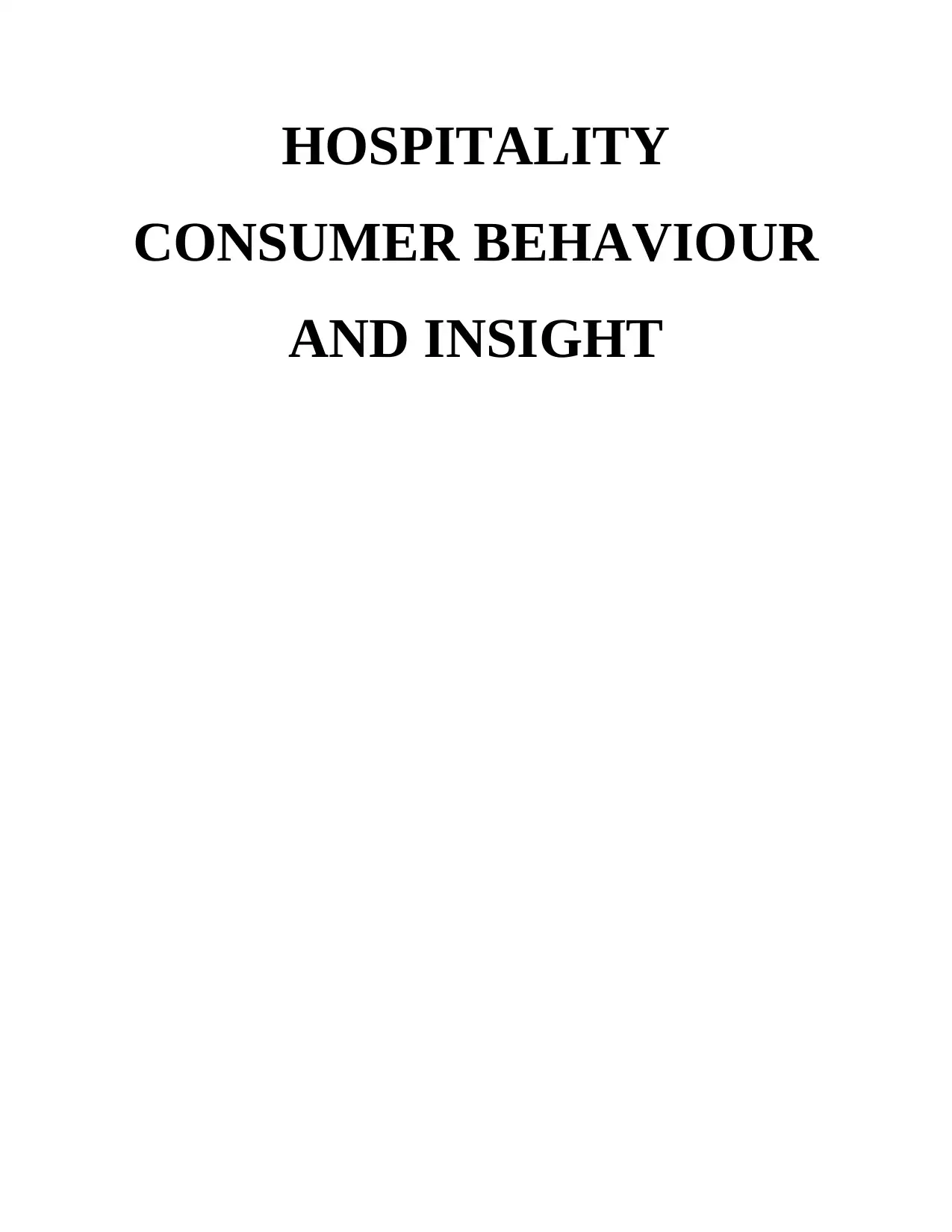
HOSPITALITY
CONSUMER BEHAVIOUR
AND INSIGHT
CONSUMER BEHAVIOUR
AND INSIGHT
Paraphrase This Document
Need a fresh take? Get an instant paraphrase of this document with our AI Paraphraser
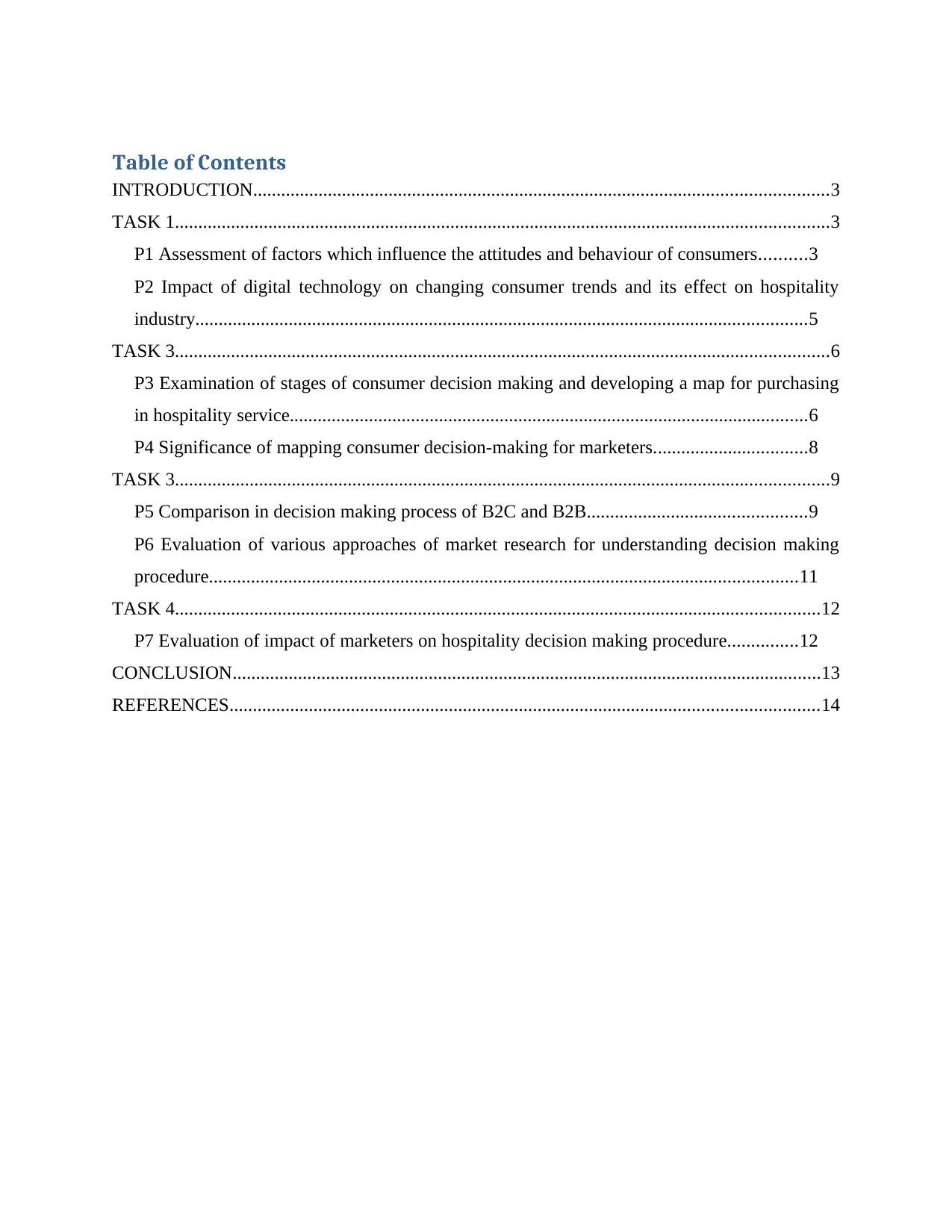
Table of Contents
INTRODUCTION...........................................................................................................................3
TASK 1............................................................................................................................................3
P1 Assessment of factors which influence the attitudes and behaviour of consumers..........3
P2 Impact of digital technology on changing consumer trends and its effect on hospitality
industry...................................................................................................................................5
TASK 3............................................................................................................................................6
P3 Examination of stages of consumer decision making and developing a map for purchasing
in hospitality service...............................................................................................................6
P4 Significance of mapping consumer decision-making for marketers.................................8
TASK 3............................................................................................................................................9
P5 Comparison in decision making process of B2C and B2B...............................................9
P6 Evaluation of various approaches of market research for understanding decision making
procedure..............................................................................................................................11
TASK 4..........................................................................................................................................12
P7 Evaluation of impact of marketers on hospitality decision making procedure...............12
CONCLUSION..............................................................................................................................13
REFERENCES..............................................................................................................................14
INTRODUCTION...........................................................................................................................3
TASK 1............................................................................................................................................3
P1 Assessment of factors which influence the attitudes and behaviour of consumers..........3
P2 Impact of digital technology on changing consumer trends and its effect on hospitality
industry...................................................................................................................................5
TASK 3............................................................................................................................................6
P3 Examination of stages of consumer decision making and developing a map for purchasing
in hospitality service...............................................................................................................6
P4 Significance of mapping consumer decision-making for marketers.................................8
TASK 3............................................................................................................................................9
P5 Comparison in decision making process of B2C and B2B...............................................9
P6 Evaluation of various approaches of market research for understanding decision making
procedure..............................................................................................................................11
TASK 4..........................................................................................................................................12
P7 Evaluation of impact of marketers on hospitality decision making procedure...............12
CONCLUSION..............................................................................................................................13
REFERENCES..............................................................................................................................14
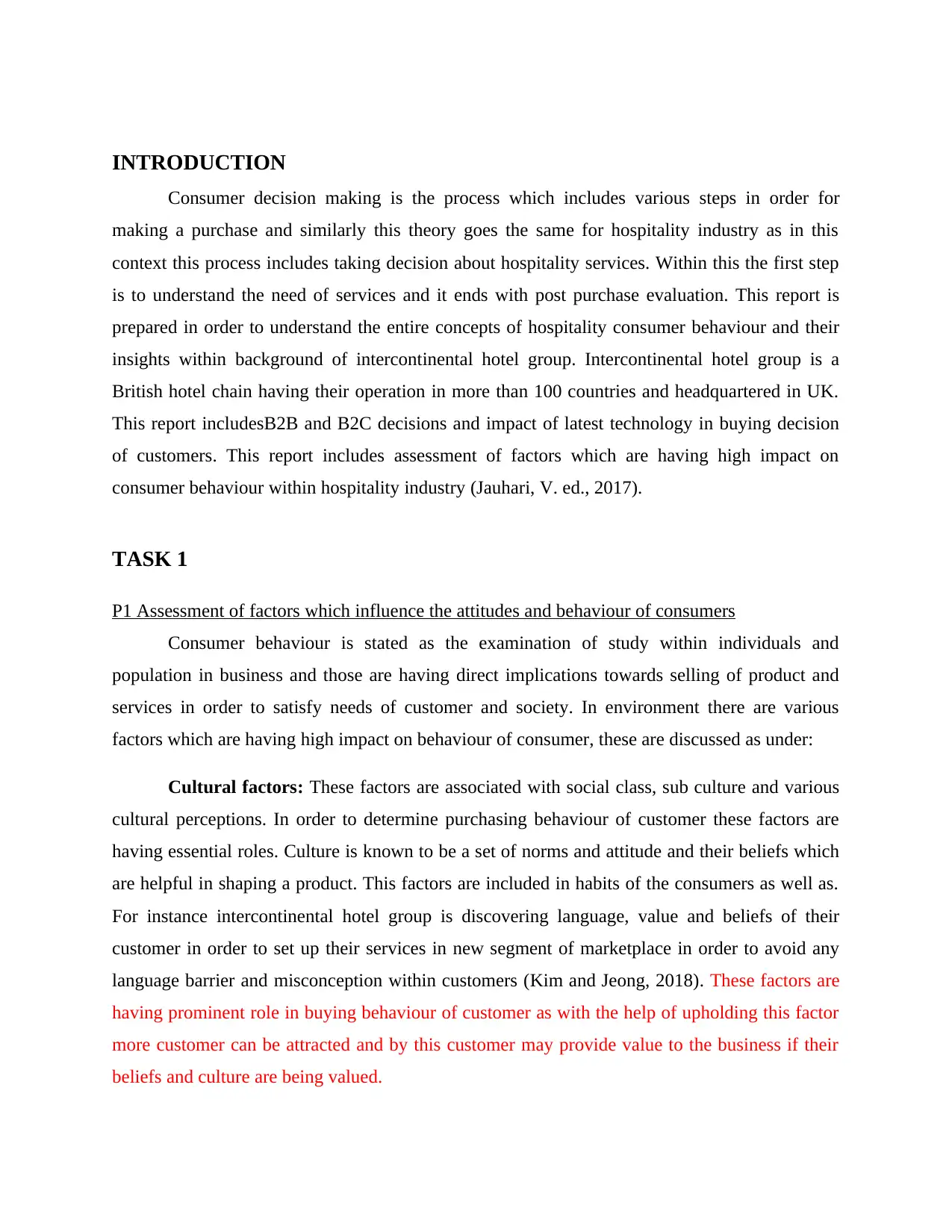
INTRODUCTION
Consumer decision making is the process which includes various steps in order for
making a purchase and similarly this theory goes the same for hospitality industry as in this
context this process includes taking decision about hospitality services. Within this the first step
is to understand the need of services and it ends with post purchase evaluation. This report is
prepared in order to understand the entire concepts of hospitality consumer behaviour and their
insights within background of intercontinental hotel group. Intercontinental hotel group is a
British hotel chain having their operation in more than 100 countries and headquartered in UK.
This report includesB2B and B2C decisions and impact of latest technology in buying decision
of customers. This report includes assessment of factors which are having high impact on
consumer behaviour within hospitality industry (Jauhari, V. ed., 2017).
TASK 1
P1 Assessment of factors which influence the attitudes and behaviour of consumers
Consumer behaviour is stated as the examination of study within individuals and
population in business and those are having direct implications towards selling of product and
services in order to satisfy needs of customer and society. In environment there are various
factors which are having high impact on behaviour of consumer, these are discussed as under:
Cultural factors: These factors are associated with social class, sub culture and various
cultural perceptions. In order to determine purchasing behaviour of customer these factors are
having essential roles. Culture is known to be a set of norms and attitude and their beliefs which
are helpful in shaping a product. This factors are included in habits of the consumers as well as.
For instance intercontinental hotel group is discovering language, value and beliefs of their
customer in order to set up their services in new segment of marketplace in order to avoid any
language barrier and misconception within customers (Kim and Jeong, 2018). These factors are
having prominent role in buying behaviour of customer as with the help of upholding this factor
more customer can be attracted and by this customer may provide value to the business if their
beliefs and culture are being valued.
Consumer decision making is the process which includes various steps in order for
making a purchase and similarly this theory goes the same for hospitality industry as in this
context this process includes taking decision about hospitality services. Within this the first step
is to understand the need of services and it ends with post purchase evaluation. This report is
prepared in order to understand the entire concepts of hospitality consumer behaviour and their
insights within background of intercontinental hotel group. Intercontinental hotel group is a
British hotel chain having their operation in more than 100 countries and headquartered in UK.
This report includesB2B and B2C decisions and impact of latest technology in buying decision
of customers. This report includes assessment of factors which are having high impact on
consumer behaviour within hospitality industry (Jauhari, V. ed., 2017).
TASK 1
P1 Assessment of factors which influence the attitudes and behaviour of consumers
Consumer behaviour is stated as the examination of study within individuals and
population in business and those are having direct implications towards selling of product and
services in order to satisfy needs of customer and society. In environment there are various
factors which are having high impact on behaviour of consumer, these are discussed as under:
Cultural factors: These factors are associated with social class, sub culture and various
cultural perceptions. In order to determine purchasing behaviour of customer these factors are
having essential roles. Culture is known to be a set of norms and attitude and their beliefs which
are helpful in shaping a product. This factors are included in habits of the consumers as well as.
For instance intercontinental hotel group is discovering language, value and beliefs of their
customer in order to set up their services in new segment of marketplace in order to avoid any
language barrier and misconception within customers (Kim and Jeong, 2018). These factors are
having prominent role in buying behaviour of customer as with the help of upholding this factor
more customer can be attracted and by this customer may provide value to the business if their
beliefs and culture are being valued.
⊘ This is a preview!⊘
Do you want full access?
Subscribe today to unlock all pages.

Trusted by 1+ million students worldwide
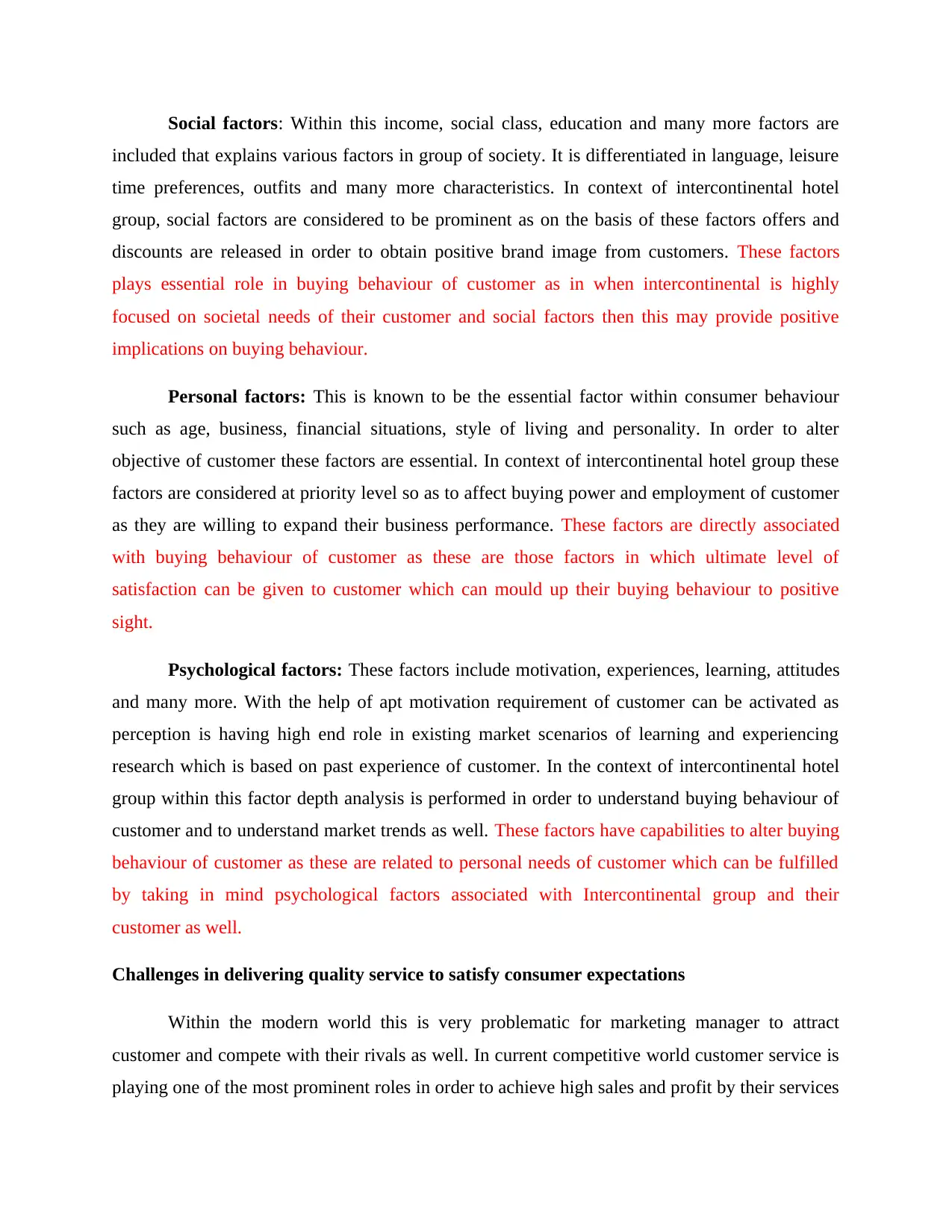
Social factors: Within this income, social class, education and many more factors are
included that explains various factors in group of society. It is differentiated in language, leisure
time preferences, outfits and many more characteristics. In context of intercontinental hotel
group, social factors are considered to be prominent as on the basis of these factors offers and
discounts are released in order to obtain positive brand image from customers. These factors
plays essential role in buying behaviour of customer as in when intercontinental is highly
focused on societal needs of their customer and social factors then this may provide positive
implications on buying behaviour.
Personal factors: This is known to be the essential factor within consumer behaviour
such as age, business, financial situations, style of living and personality. In order to alter
objective of customer these factors are essential. In context of intercontinental hotel group these
factors are considered at priority level so as to affect buying power and employment of customer
as they are willing to expand their business performance. These factors are directly associated
with buying behaviour of customer as these are those factors in which ultimate level of
satisfaction can be given to customer which can mould up their buying behaviour to positive
sight.
Psychological factors: These factors include motivation, experiences, learning, attitudes
and many more. With the help of apt motivation requirement of customer can be activated as
perception is having high end role in existing market scenarios of learning and experiencing
research which is based on past experience of customer. In the context of intercontinental hotel
group within this factor depth analysis is performed in order to understand buying behaviour of
customer and to understand market trends as well. These factors have capabilities to alter buying
behaviour of customer as these are related to personal needs of customer which can be fulfilled
by taking in mind psychological factors associated with Intercontinental group and their
customer as well.
Challenges in delivering quality service to satisfy consumer expectations
Within the modern world this is very problematic for marketing manager to attract
customer and compete with their rivals as well. In current competitive world customer service is
playing one of the most prominent roles in order to achieve high sales and profit by their services
included that explains various factors in group of society. It is differentiated in language, leisure
time preferences, outfits and many more characteristics. In context of intercontinental hotel
group, social factors are considered to be prominent as on the basis of these factors offers and
discounts are released in order to obtain positive brand image from customers. These factors
plays essential role in buying behaviour of customer as in when intercontinental is highly
focused on societal needs of their customer and social factors then this may provide positive
implications on buying behaviour.
Personal factors: This is known to be the essential factor within consumer behaviour
such as age, business, financial situations, style of living and personality. In order to alter
objective of customer these factors are essential. In context of intercontinental hotel group these
factors are considered at priority level so as to affect buying power and employment of customer
as they are willing to expand their business performance. These factors are directly associated
with buying behaviour of customer as these are those factors in which ultimate level of
satisfaction can be given to customer which can mould up their buying behaviour to positive
sight.
Psychological factors: These factors include motivation, experiences, learning, attitudes
and many more. With the help of apt motivation requirement of customer can be activated as
perception is having high end role in existing market scenarios of learning and experiencing
research which is based on past experience of customer. In the context of intercontinental hotel
group within this factor depth analysis is performed in order to understand buying behaviour of
customer and to understand market trends as well. These factors have capabilities to alter buying
behaviour of customer as these are related to personal needs of customer which can be fulfilled
by taking in mind psychological factors associated with Intercontinental group and their
customer as well.
Challenges in delivering quality service to satisfy consumer expectations
Within the modern world this is very problematic for marketing manager to attract
customer and compete with their rivals as well. In current competitive world customer service is
playing one of the most prominent roles in order to achieve high sales and profit by their services
Paraphrase This Document
Need a fresh take? Get an instant paraphrase of this document with our AI Paraphraser
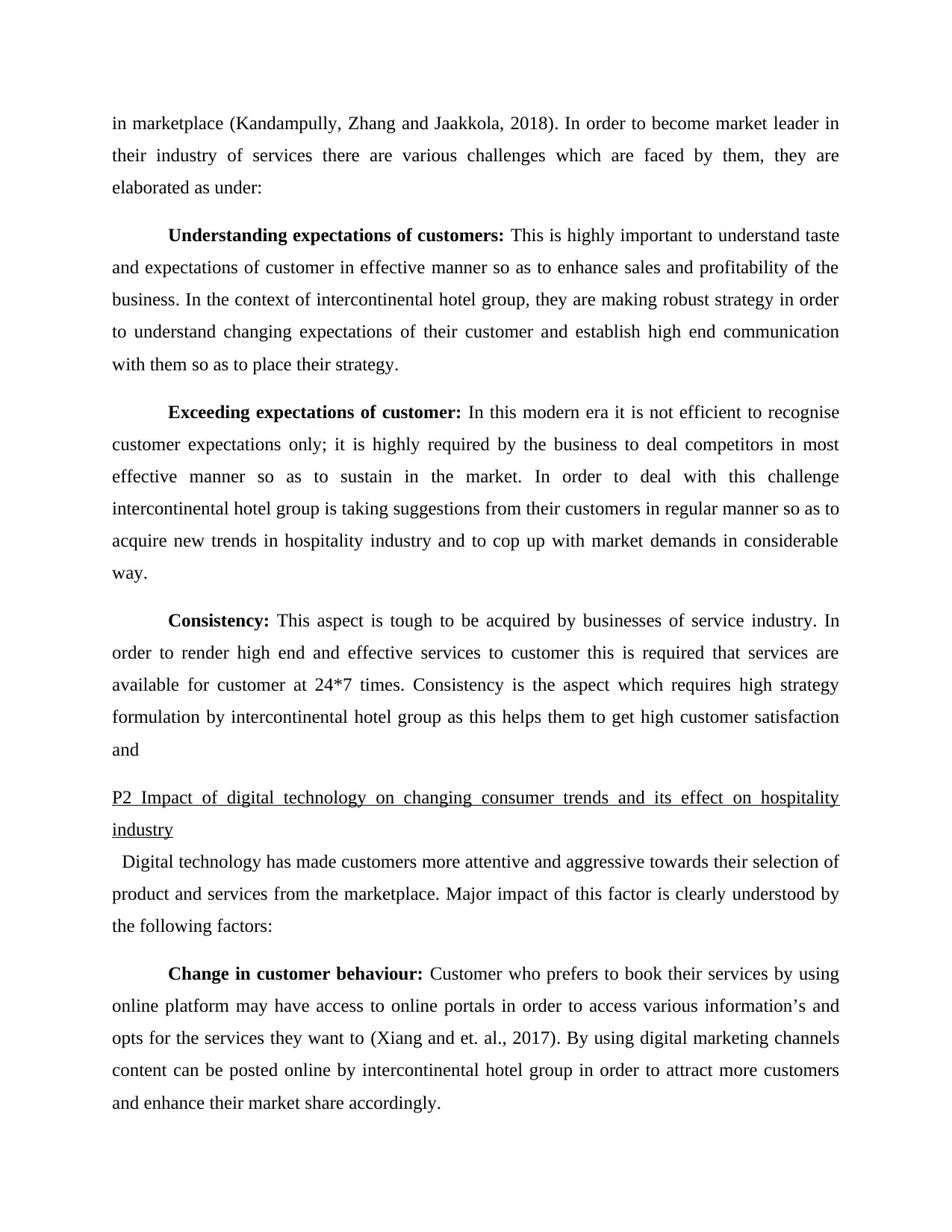
in marketplace (Kandampully, Zhang and Jaakkola, 2018). In order to become market leader in
their industry of services there are various challenges which are faced by them, they are
elaborated as under:
Understanding expectations of customers: This is highly important to understand taste
and expectations of customer in effective manner so as to enhance sales and profitability of the
business. In the context of intercontinental hotel group, they are making robust strategy in order
to understand changing expectations of their customer and establish high end communication
with them so as to place their strategy.
Exceeding expectations of customer: In this modern era it is not efficient to recognise
customer expectations only; it is highly required by the business to deal competitors in most
effective manner so as to sustain in the market. In order to deal with this challenge
intercontinental hotel group is taking suggestions from their customers in regular manner so as to
acquire new trends in hospitality industry and to cop up with market demands in considerable
way.
Consistency: This aspect is tough to be acquired by businesses of service industry. In
order to render high end and effective services to customer this is required that services are
available for customer at 24*7 times. Consistency is the aspect which requires high strategy
formulation by intercontinental hotel group as this helps them to get high customer satisfaction
and
P2 Impact of digital technology on changing consumer trends and its effect on hospitality
industry
Digital technology has made customers more attentive and aggressive towards their selection of
product and services from the marketplace. Major impact of this factor is clearly understood by
the following factors:
Change in customer behaviour: Customer who prefers to book their services by using
online platform may have access to online portals in order to access various information’s and
opts for the services they want to (Xiang and et. al., 2017). By using digital marketing channels
content can be posted online by intercontinental hotel group in order to attract more customers
and enhance their market share accordingly.
their industry of services there are various challenges which are faced by them, they are
elaborated as under:
Understanding expectations of customers: This is highly important to understand taste
and expectations of customer in effective manner so as to enhance sales and profitability of the
business. In the context of intercontinental hotel group, they are making robust strategy in order
to understand changing expectations of their customer and establish high end communication
with them so as to place their strategy.
Exceeding expectations of customer: In this modern era it is not efficient to recognise
customer expectations only; it is highly required by the business to deal competitors in most
effective manner so as to sustain in the market. In order to deal with this challenge
intercontinental hotel group is taking suggestions from their customers in regular manner so as to
acquire new trends in hospitality industry and to cop up with market demands in considerable
way.
Consistency: This aspect is tough to be acquired by businesses of service industry. In
order to render high end and effective services to customer this is required that services are
available for customer at 24*7 times. Consistency is the aspect which requires high strategy
formulation by intercontinental hotel group as this helps them to get high customer satisfaction
and
P2 Impact of digital technology on changing consumer trends and its effect on hospitality
industry
Digital technology has made customers more attentive and aggressive towards their selection of
product and services from the marketplace. Major impact of this factor is clearly understood by
the following factors:
Change in customer behaviour: Customer who prefers to book their services by using
online platform may have access to online portals in order to access various information’s and
opts for the services they want to (Xiang and et. al., 2017). By using digital marketing channels
content can be posted online by intercontinental hotel group in order to attract more customers
and enhance their market share accordingly.
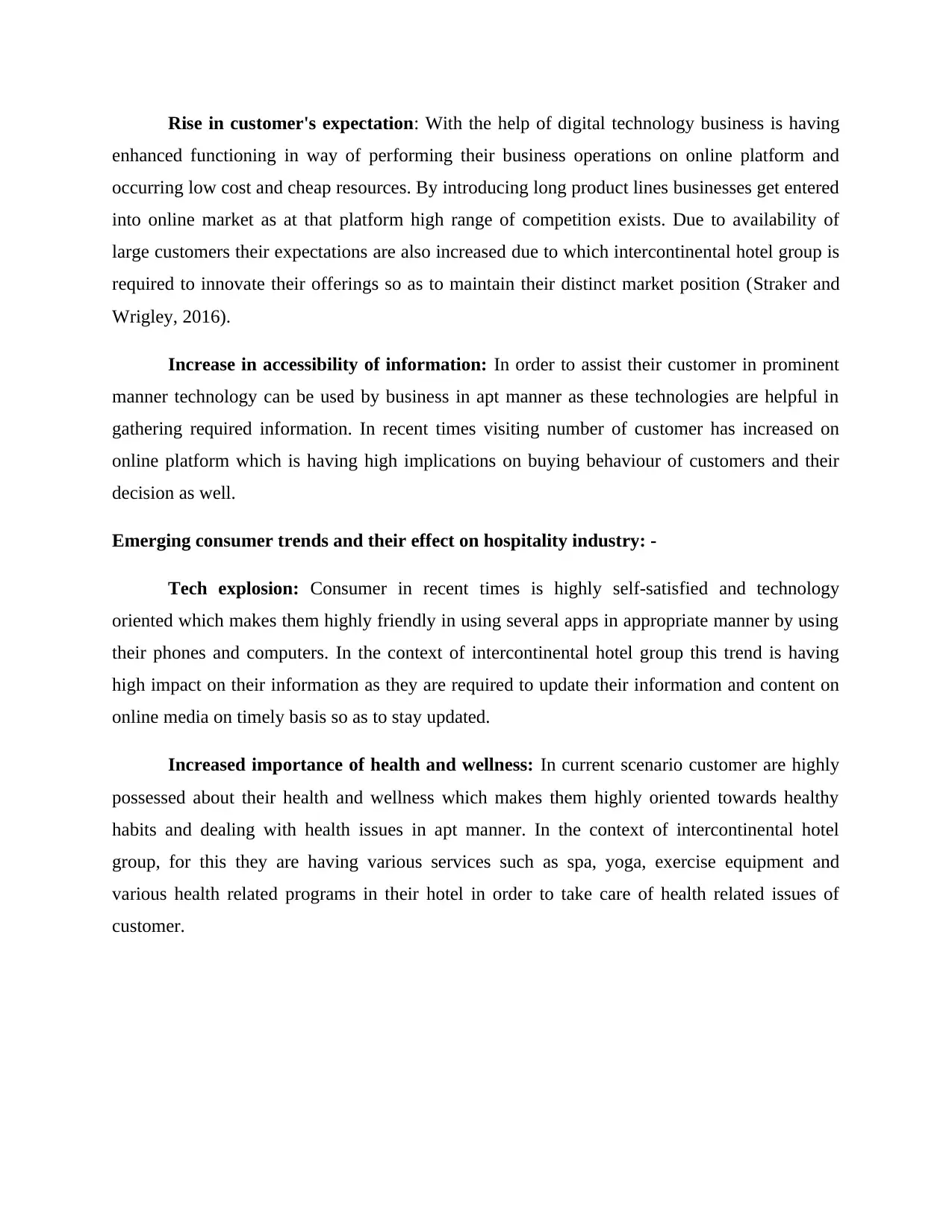
Rise in customer's expectation: With the help of digital technology business is having
enhanced functioning in way of performing their business operations on online platform and
occurring low cost and cheap resources. By introducing long product lines businesses get entered
into online market as at that platform high range of competition exists. Due to availability of
large customers their expectations are also increased due to which intercontinental hotel group is
required to innovate their offerings so as to maintain their distinct market position (Straker and
Wrigley, 2016).
Increase in accessibility of information: In order to assist their customer in prominent
manner technology can be used by business in apt manner as these technologies are helpful in
gathering required information. In recent times visiting number of customer has increased on
online platform which is having high implications on buying behaviour of customers and their
decision as well.
Emerging consumer trends and their effect on hospitality industry: -
Tech explosion: Consumer in recent times is highly self-satisfied and technology
oriented which makes them highly friendly in using several apps in appropriate manner by using
their phones and computers. In the context of intercontinental hotel group this trend is having
high impact on their information as they are required to update their information and content on
online media on timely basis so as to stay updated.
Increased importance of health and wellness: In current scenario customer are highly
possessed about their health and wellness which makes them highly oriented towards healthy
habits and dealing with health issues in apt manner. In the context of intercontinental hotel
group, for this they are having various services such as spa, yoga, exercise equipment and
various health related programs in their hotel in order to take care of health related issues of
customer.
enhanced functioning in way of performing their business operations on online platform and
occurring low cost and cheap resources. By introducing long product lines businesses get entered
into online market as at that platform high range of competition exists. Due to availability of
large customers their expectations are also increased due to which intercontinental hotel group is
required to innovate their offerings so as to maintain their distinct market position (Straker and
Wrigley, 2016).
Increase in accessibility of information: In order to assist their customer in prominent
manner technology can be used by business in apt manner as these technologies are helpful in
gathering required information. In recent times visiting number of customer has increased on
online platform which is having high implications on buying behaviour of customers and their
decision as well.
Emerging consumer trends and their effect on hospitality industry: -
Tech explosion: Consumer in recent times is highly self-satisfied and technology
oriented which makes them highly friendly in using several apps in appropriate manner by using
their phones and computers. In the context of intercontinental hotel group this trend is having
high impact on their information as they are required to update their information and content on
online media on timely basis so as to stay updated.
Increased importance of health and wellness: In current scenario customer are highly
possessed about their health and wellness which makes them highly oriented towards healthy
habits and dealing with health issues in apt manner. In the context of intercontinental hotel
group, for this they are having various services such as spa, yoga, exercise equipment and
various health related programs in their hotel in order to take care of health related issues of
customer.
⊘ This is a preview!⊘
Do you want full access?
Subscribe today to unlock all pages.

Trusted by 1+ million students worldwide
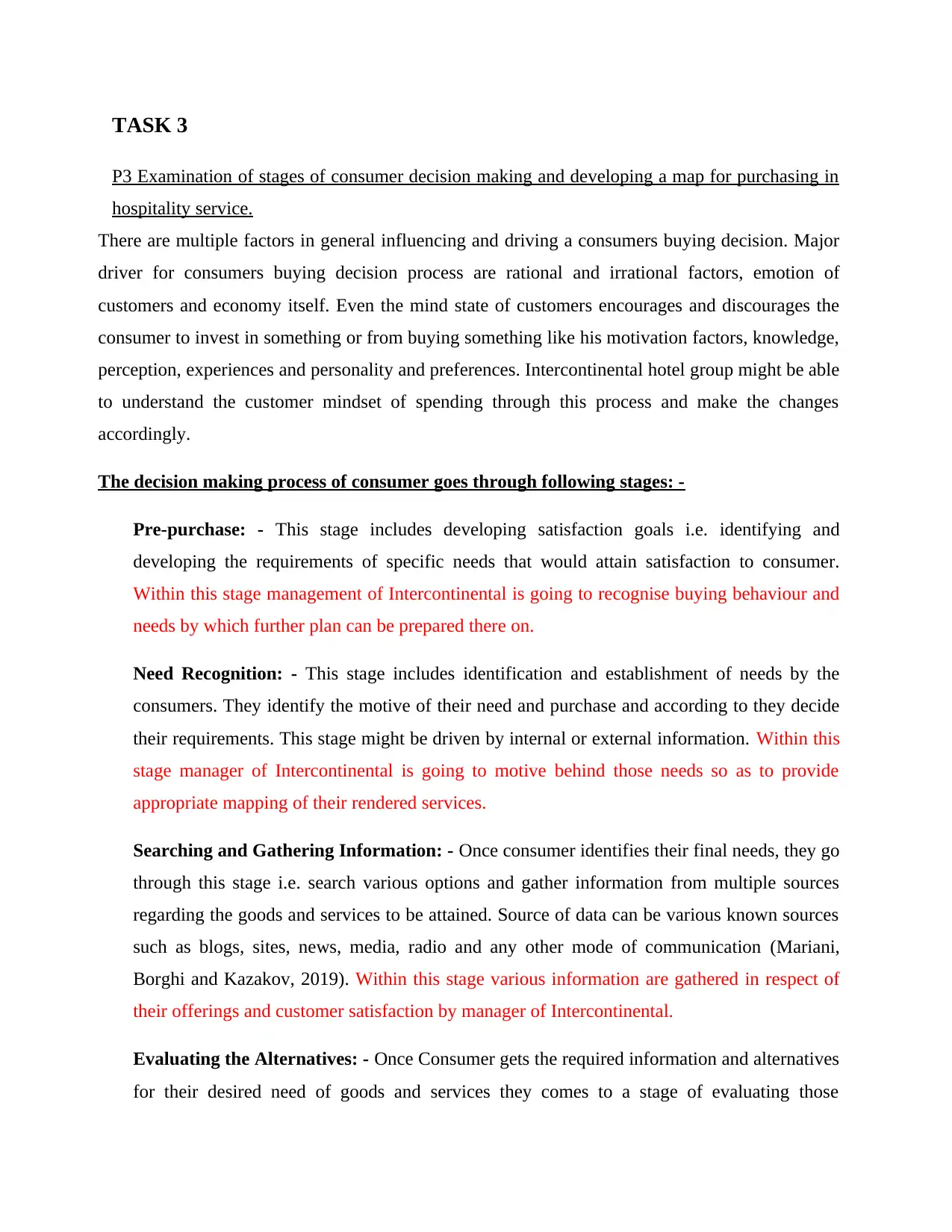
TASK 3
P3 Examination of stages of consumer decision making and developing a map for purchasing in
hospitality service.
There are multiple factors in general influencing and driving a consumers buying decision. Major
driver for consumers buying decision process are rational and irrational factors, emotion of
customers and economy itself. Even the mind state of customers encourages and discourages the
consumer to invest in something or from buying something like his motivation factors, knowledge,
perception, experiences and personality and preferences. Intercontinental hotel group might be able
to understand the customer mindset of spending through this process and make the changes
accordingly.
The decision making process of consumer goes through following stages: -
Pre-purchase: - This stage includes developing satisfaction goals i.e. identifying and
developing the requirements of specific needs that would attain satisfaction to consumer.
Within this stage management of Intercontinental is going to recognise buying behaviour and
needs by which further plan can be prepared there on.
Need Recognition: - This stage includes identification and establishment of needs by the
consumers. They identify the motive of their need and purchase and according to they decide
their requirements. This stage might be driven by internal or external information. Within this
stage manager of Intercontinental is going to motive behind those needs so as to provide
appropriate mapping of their rendered services.
Searching and Gathering Information: - Once consumer identifies their final needs, they go
through this stage i.e. search various options and gather information from multiple sources
regarding the goods and services to be attained. Source of data can be various known sources
such as blogs, sites, news, media, radio and any other mode of communication (Mariani,
Borghi and Kazakov, 2019). Within this stage various information are gathered in respect of
their offerings and customer satisfaction by manager of Intercontinental.
Evaluating the Alternatives: - Once Consumer gets the required information and alternatives
for their desired need of goods and services they comes to a stage of evaluating those
P3 Examination of stages of consumer decision making and developing a map for purchasing in
hospitality service.
There are multiple factors in general influencing and driving a consumers buying decision. Major
driver for consumers buying decision process are rational and irrational factors, emotion of
customers and economy itself. Even the mind state of customers encourages and discourages the
consumer to invest in something or from buying something like his motivation factors, knowledge,
perception, experiences and personality and preferences. Intercontinental hotel group might be able
to understand the customer mindset of spending through this process and make the changes
accordingly.
The decision making process of consumer goes through following stages: -
Pre-purchase: - This stage includes developing satisfaction goals i.e. identifying and
developing the requirements of specific needs that would attain satisfaction to consumer.
Within this stage management of Intercontinental is going to recognise buying behaviour and
needs by which further plan can be prepared there on.
Need Recognition: - This stage includes identification and establishment of needs by the
consumers. They identify the motive of their need and purchase and according to they decide
their requirements. This stage might be driven by internal or external information. Within this
stage manager of Intercontinental is going to motive behind those needs so as to provide
appropriate mapping of their rendered services.
Searching and Gathering Information: - Once consumer identifies their final needs, they go
through this stage i.e. search various options and gather information from multiple sources
regarding the goods and services to be attained. Source of data can be various known sources
such as blogs, sites, news, media, radio and any other mode of communication (Mariani,
Borghi and Kazakov, 2019). Within this stage various information are gathered in respect of
their offerings and customer satisfaction by manager of Intercontinental.
Evaluating the Alternatives: - Once Consumer gets the required information and alternatives
for their desired need of goods and services they comes to a stage of evaluating those
Paraphrase This Document
Need a fresh take? Get an instant paraphrase of this document with our AI Paraphraser
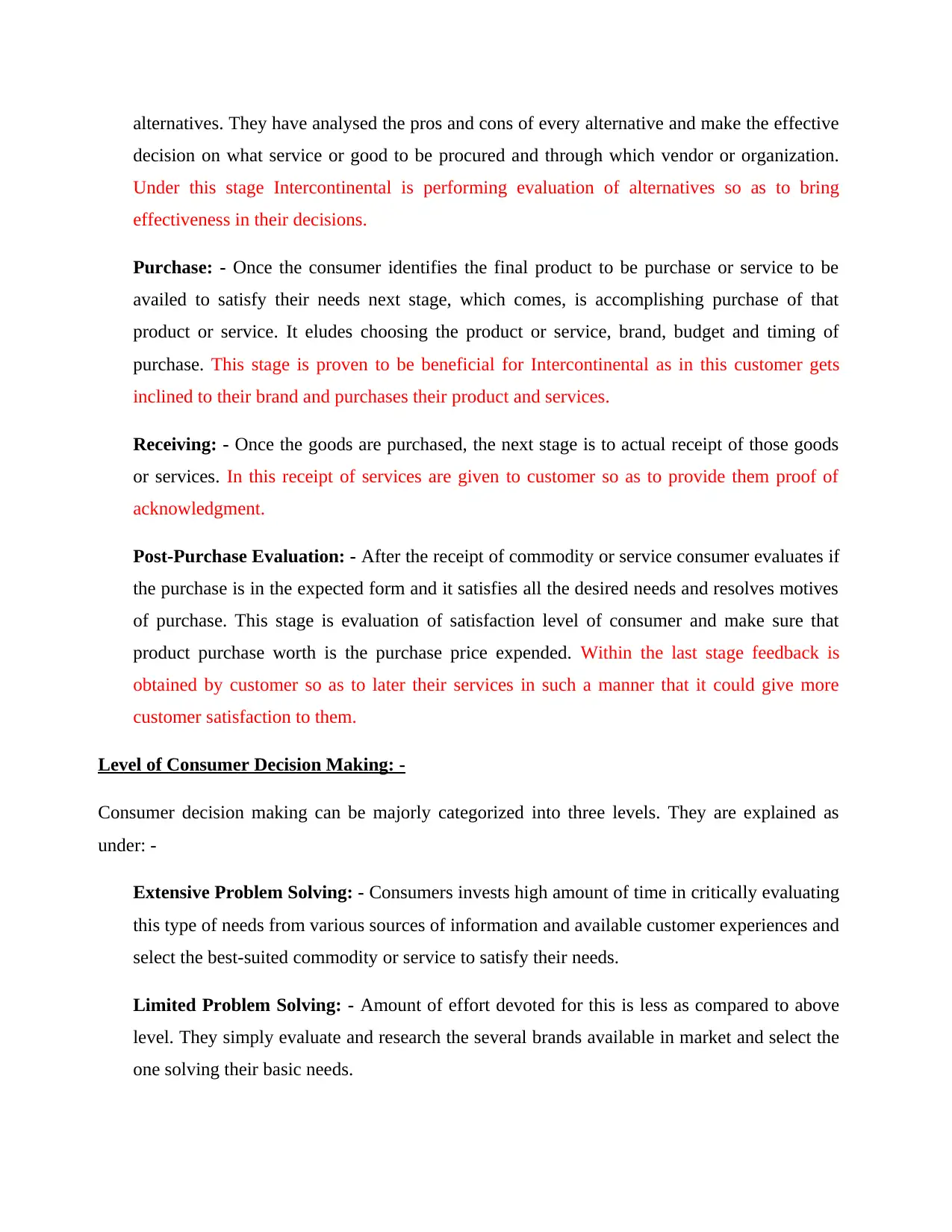
alternatives. They have analysed the pros and cons of every alternative and make the effective
decision on what service or good to be procured and through which vendor or organization.
Under this stage Intercontinental is performing evaluation of alternatives so as to bring
effectiveness in their decisions.
Purchase: - Once the consumer identifies the final product to be purchase or service to be
availed to satisfy their needs next stage, which comes, is accomplishing purchase of that
product or service. It eludes choosing the product or service, brand, budget and timing of
purchase. This stage is proven to be beneficial for Intercontinental as in this customer gets
inclined to their brand and purchases their product and services.
Receiving: - Once the goods are purchased, the next stage is to actual receipt of those goods
or services. In this receipt of services are given to customer so as to provide them proof of
acknowledgment.
Post-Purchase Evaluation: - After the receipt of commodity or service consumer evaluates if
the purchase is in the expected form and it satisfies all the desired needs and resolves motives
of purchase. This stage is evaluation of satisfaction level of consumer and make sure that
product purchase worth is the purchase price expended. Within the last stage feedback is
obtained by customer so as to later their services in such a manner that it could give more
customer satisfaction to them.
Level of Consumer Decision Making: -
Consumer decision making can be majorly categorized into three levels. They are explained as
under: -
Extensive Problem Solving: - Consumers invests high amount of time in critically evaluating
this type of needs from various sources of information and available customer experiences and
select the best-suited commodity or service to satisfy their needs.
Limited Problem Solving: - Amount of effort devoted for this is less as compared to above
level. They simply evaluate and research the several brands available in market and select the
one solving their basic needs.
decision on what service or good to be procured and through which vendor or organization.
Under this stage Intercontinental is performing evaluation of alternatives so as to bring
effectiveness in their decisions.
Purchase: - Once the consumer identifies the final product to be purchase or service to be
availed to satisfy their needs next stage, which comes, is accomplishing purchase of that
product or service. It eludes choosing the product or service, brand, budget and timing of
purchase. This stage is proven to be beneficial for Intercontinental as in this customer gets
inclined to their brand and purchases their product and services.
Receiving: - Once the goods are purchased, the next stage is to actual receipt of those goods
or services. In this receipt of services are given to customer so as to provide them proof of
acknowledgment.
Post-Purchase Evaluation: - After the receipt of commodity or service consumer evaluates if
the purchase is in the expected form and it satisfies all the desired needs and resolves motives
of purchase. This stage is evaluation of satisfaction level of consumer and make sure that
product purchase worth is the purchase price expended. Within the last stage feedback is
obtained by customer so as to later their services in such a manner that it could give more
customer satisfaction to them.
Level of Consumer Decision Making: -
Consumer decision making can be majorly categorized into three levels. They are explained as
under: -
Extensive Problem Solving: - Consumers invests high amount of time in critically evaluating
this type of needs from various sources of information and available customer experiences and
select the best-suited commodity or service to satisfy their needs.
Limited Problem Solving: - Amount of effort devoted for this is less as compared to above
level. They simply evaluate and research the several brands available in market and select the
one solving their basic needs.
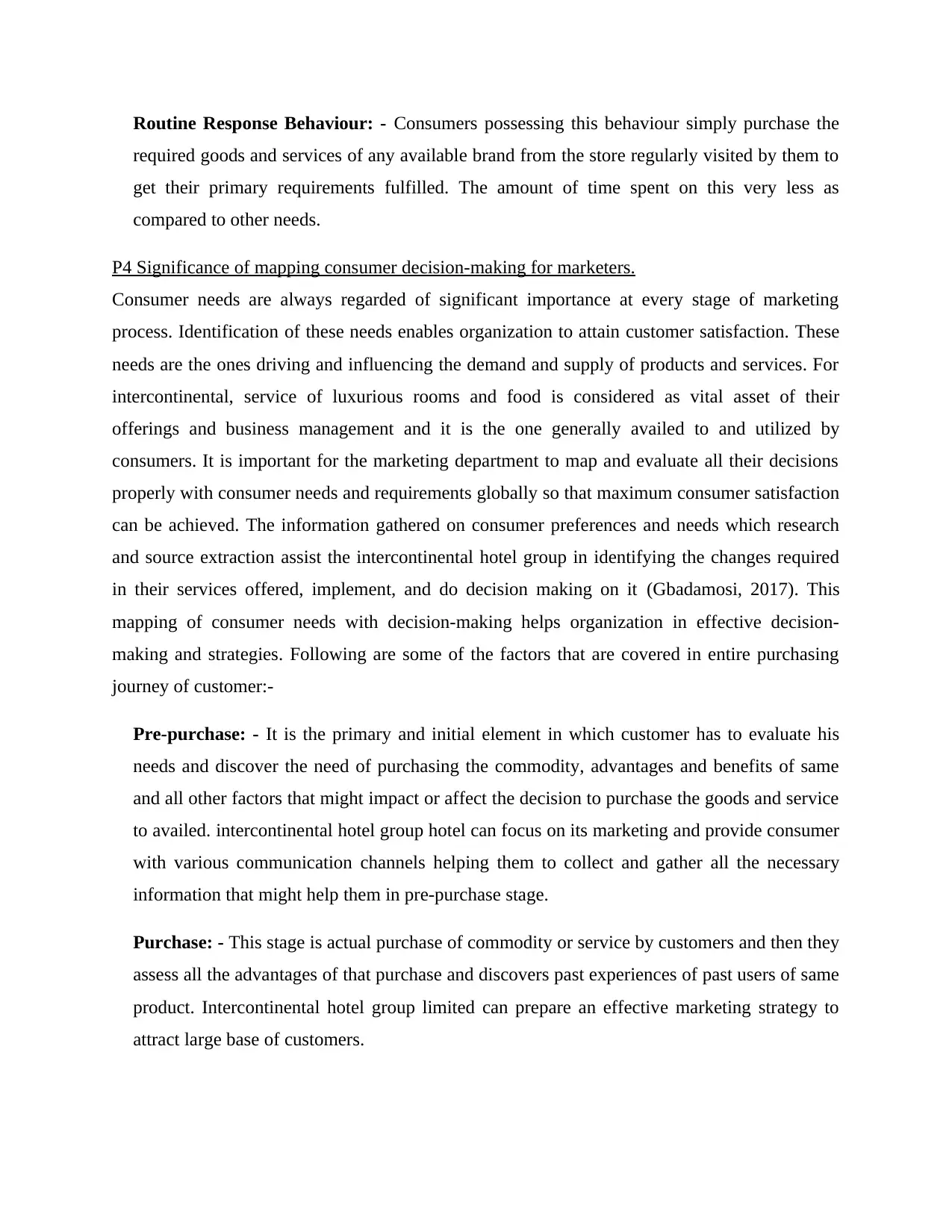
Routine Response Behaviour: - Consumers possessing this behaviour simply purchase the
required goods and services of any available brand from the store regularly visited by them to
get their primary requirements fulfilled. The amount of time spent on this very less as
compared to other needs.
P4 Significance of mapping consumer decision-making for marketers.
Consumer needs are always regarded of significant importance at every stage of marketing
process. Identification of these needs enables organization to attain customer satisfaction. These
needs are the ones driving and influencing the demand and supply of products and services. For
intercontinental, service of luxurious rooms and food is considered as vital asset of their
offerings and business management and it is the one generally availed to and utilized by
consumers. It is important for the marketing department to map and evaluate all their decisions
properly with consumer needs and requirements globally so that maximum consumer satisfaction
can be achieved. The information gathered on consumer preferences and needs which research
and source extraction assist the intercontinental hotel group in identifying the changes required
in their services offered, implement, and do decision making on it (Gbadamosi, 2017). This
mapping of consumer needs with decision-making helps organization in effective decision-
making and strategies. Following are some of the factors that are covered in entire purchasing
journey of customer:-
Pre-purchase: - It is the primary and initial element in which customer has to evaluate his
needs and discover the need of purchasing the commodity, advantages and benefits of same
and all other factors that might impact or affect the decision to purchase the goods and service
to availed. intercontinental hotel group hotel can focus on its marketing and provide consumer
with various communication channels helping them to collect and gather all the necessary
information that might help them in pre-purchase stage.
Purchase: - This stage is actual purchase of commodity or service by customers and then they
assess all the advantages of that purchase and discovers past experiences of past users of same
product. Intercontinental hotel group limited can prepare an effective marketing strategy to
attract large base of customers.
required goods and services of any available brand from the store regularly visited by them to
get their primary requirements fulfilled. The amount of time spent on this very less as
compared to other needs.
P4 Significance of mapping consumer decision-making for marketers.
Consumer needs are always regarded of significant importance at every stage of marketing
process. Identification of these needs enables organization to attain customer satisfaction. These
needs are the ones driving and influencing the demand and supply of products and services. For
intercontinental, service of luxurious rooms and food is considered as vital asset of their
offerings and business management and it is the one generally availed to and utilized by
consumers. It is important for the marketing department to map and evaluate all their decisions
properly with consumer needs and requirements globally so that maximum consumer satisfaction
can be achieved. The information gathered on consumer preferences and needs which research
and source extraction assist the intercontinental hotel group in identifying the changes required
in their services offered, implement, and do decision making on it (Gbadamosi, 2017). This
mapping of consumer needs with decision-making helps organization in effective decision-
making and strategies. Following are some of the factors that are covered in entire purchasing
journey of customer:-
Pre-purchase: - It is the primary and initial element in which customer has to evaluate his
needs and discover the need of purchasing the commodity, advantages and benefits of same
and all other factors that might impact or affect the decision to purchase the goods and service
to availed. intercontinental hotel group hotel can focus on its marketing and provide consumer
with various communication channels helping them to collect and gather all the necessary
information that might help them in pre-purchase stage.
Purchase: - This stage is actual purchase of commodity or service by customers and then they
assess all the advantages of that purchase and discovers past experiences of past users of same
product. Intercontinental hotel group limited can prepare an effective marketing strategy to
attract large base of customers.
⊘ This is a preview!⊘
Do you want full access?
Subscribe today to unlock all pages.

Trusted by 1+ million students worldwide
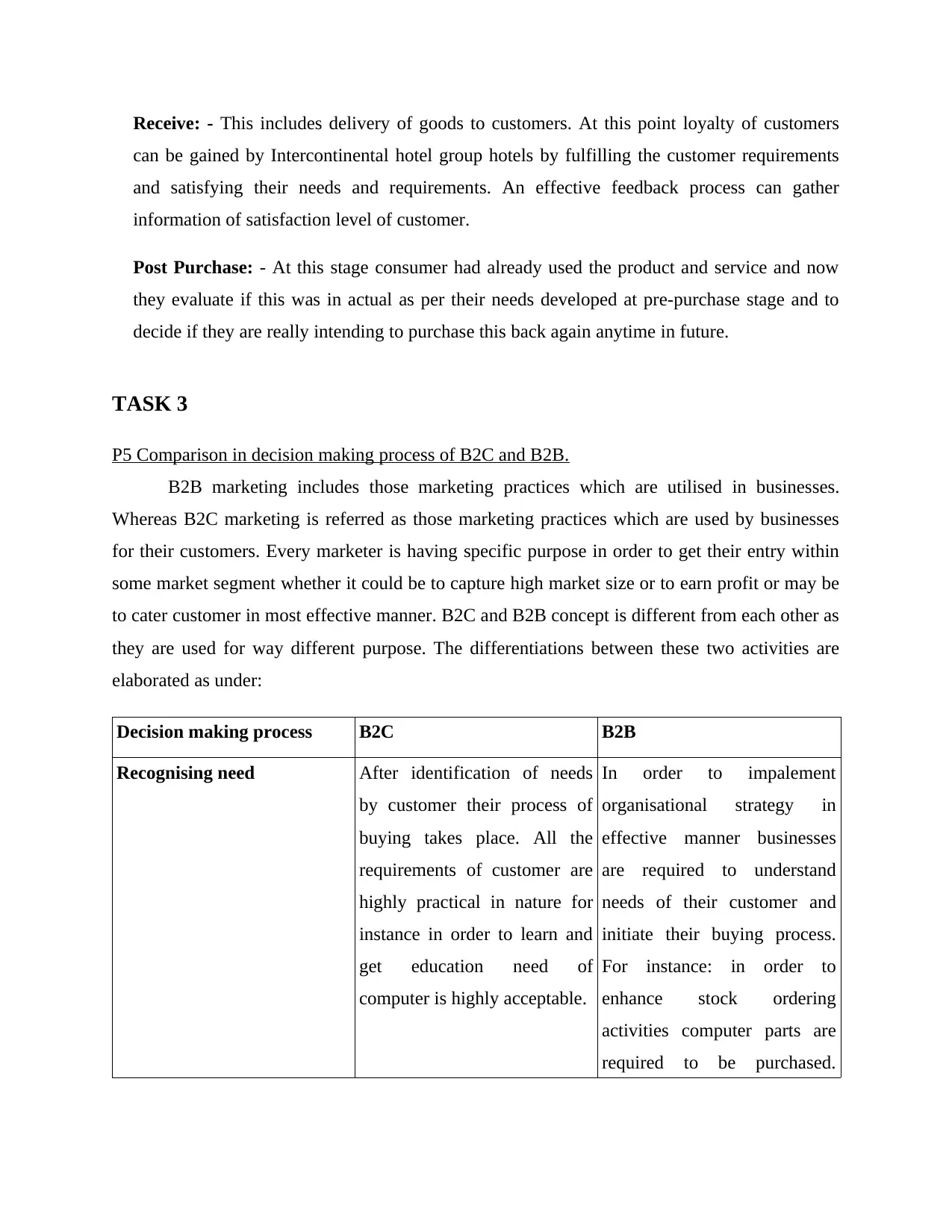
Receive: - This includes delivery of goods to customers. At this point loyalty of customers
can be gained by Intercontinental hotel group hotels by fulfilling the customer requirements
and satisfying their needs and requirements. An effective feedback process can gather
information of satisfaction level of customer.
Post Purchase: - At this stage consumer had already used the product and service and now
they evaluate if this was in actual as per their needs developed at pre-purchase stage and to
decide if they are really intending to purchase this back again anytime in future.
TASK 3
P5 Comparison in decision making process of B2C and B2B.
B2B marketing includes those marketing practices which are utilised in businesses.
Whereas B2C marketing is referred as those marketing practices which are used by businesses
for their customers. Every marketer is having specific purpose in order to get their entry within
some market segment whether it could be to capture high market size or to earn profit or may be
to cater customer in most effective manner. B2C and B2B concept is different from each other as
they are used for way different purpose. The differentiations between these two activities are
elaborated as under:
Decision making process B2C B2B
Recognising need After identification of needs
by customer their process of
buying takes place. All the
requirements of customer are
highly practical in nature for
instance in order to learn and
get education need of
computer is highly acceptable.
In order to impalement
organisational strategy in
effective manner businesses
are required to understand
needs of their customer and
initiate their buying process.
For instance: in order to
enhance stock ordering
activities computer parts are
required to be purchased.
can be gained by Intercontinental hotel group hotels by fulfilling the customer requirements
and satisfying their needs and requirements. An effective feedback process can gather
information of satisfaction level of customer.
Post Purchase: - At this stage consumer had already used the product and service and now
they evaluate if this was in actual as per their needs developed at pre-purchase stage and to
decide if they are really intending to purchase this back again anytime in future.
TASK 3
P5 Comparison in decision making process of B2C and B2B.
B2B marketing includes those marketing practices which are utilised in businesses.
Whereas B2C marketing is referred as those marketing practices which are used by businesses
for their customers. Every marketer is having specific purpose in order to get their entry within
some market segment whether it could be to capture high market size or to earn profit or may be
to cater customer in most effective manner. B2C and B2B concept is different from each other as
they are used for way different purpose. The differentiations between these two activities are
elaborated as under:
Decision making process B2C B2B
Recognising need After identification of needs
by customer their process of
buying takes place. All the
requirements of customer are
highly practical in nature for
instance in order to learn and
get education need of
computer is highly acceptable.
In order to impalement
organisational strategy in
effective manner businesses
are required to understand
needs of their customer and
initiate their buying process.
For instance: in order to
enhance stock ordering
activities computer parts are
required to be purchased.
Paraphrase This Document
Need a fresh take? Get an instant paraphrase of this document with our AI Paraphraser
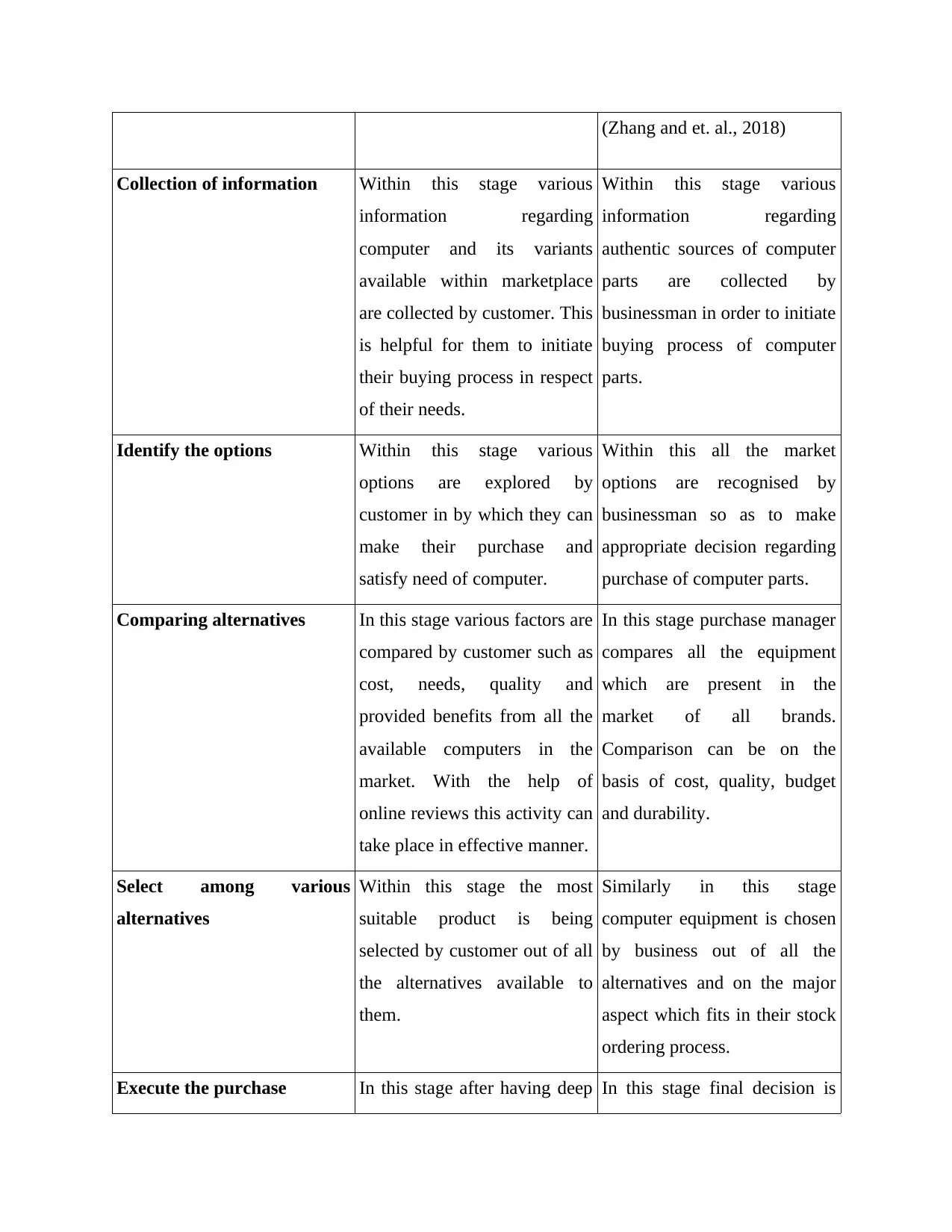
(Zhang and et. al., 2018)
Collection of information Within this stage various
information regarding
computer and its variants
available within marketplace
are collected by customer. This
is helpful for them to initiate
their buying process in respect
of their needs.
Within this stage various
information regarding
authentic sources of computer
parts are collected by
businessman in order to initiate
buying process of computer
parts.
Identify the options Within this stage various
options are explored by
customer in by which they can
make their purchase and
satisfy need of computer.
Within this all the market
options are recognised by
businessman so as to make
appropriate decision regarding
purchase of computer parts.
Comparing alternatives In this stage various factors are
compared by customer such as
cost, needs, quality and
provided benefits from all the
available computers in the
market. With the help of
online reviews this activity can
take place in effective manner.
In this stage purchase manager
compares all the equipment
which are present in the
market of all brands.
Comparison can be on the
basis of cost, quality, budget
and durability.
Select among various
alternatives
Within this stage the most
suitable product is being
selected by customer out of all
the alternatives available to
them.
Similarly in this stage
computer equipment is chosen
by business out of all the
alternatives and on the major
aspect which fits in their stock
ordering process.
Execute the purchase In this stage after having deep In this stage final decision is
Collection of information Within this stage various
information regarding
computer and its variants
available within marketplace
are collected by customer. This
is helpful for them to initiate
their buying process in respect
of their needs.
Within this stage various
information regarding
authentic sources of computer
parts are collected by
businessman in order to initiate
buying process of computer
parts.
Identify the options Within this stage various
options are explored by
customer in by which they can
make their purchase and
satisfy need of computer.
Within this all the market
options are recognised by
businessman so as to make
appropriate decision regarding
purchase of computer parts.
Comparing alternatives In this stage various factors are
compared by customer such as
cost, needs, quality and
provided benefits from all the
available computers in the
market. With the help of
online reviews this activity can
take place in effective manner.
In this stage purchase manager
compares all the equipment
which are present in the
market of all brands.
Comparison can be on the
basis of cost, quality, budget
and durability.
Select among various
alternatives
Within this stage the most
suitable product is being
selected by customer out of all
the alternatives available to
them.
Similarly in this stage
computer equipment is chosen
by business out of all the
alternatives and on the major
aspect which fits in their stock
ordering process.
Execute the purchase In this stage after having deep In this stage final decision is
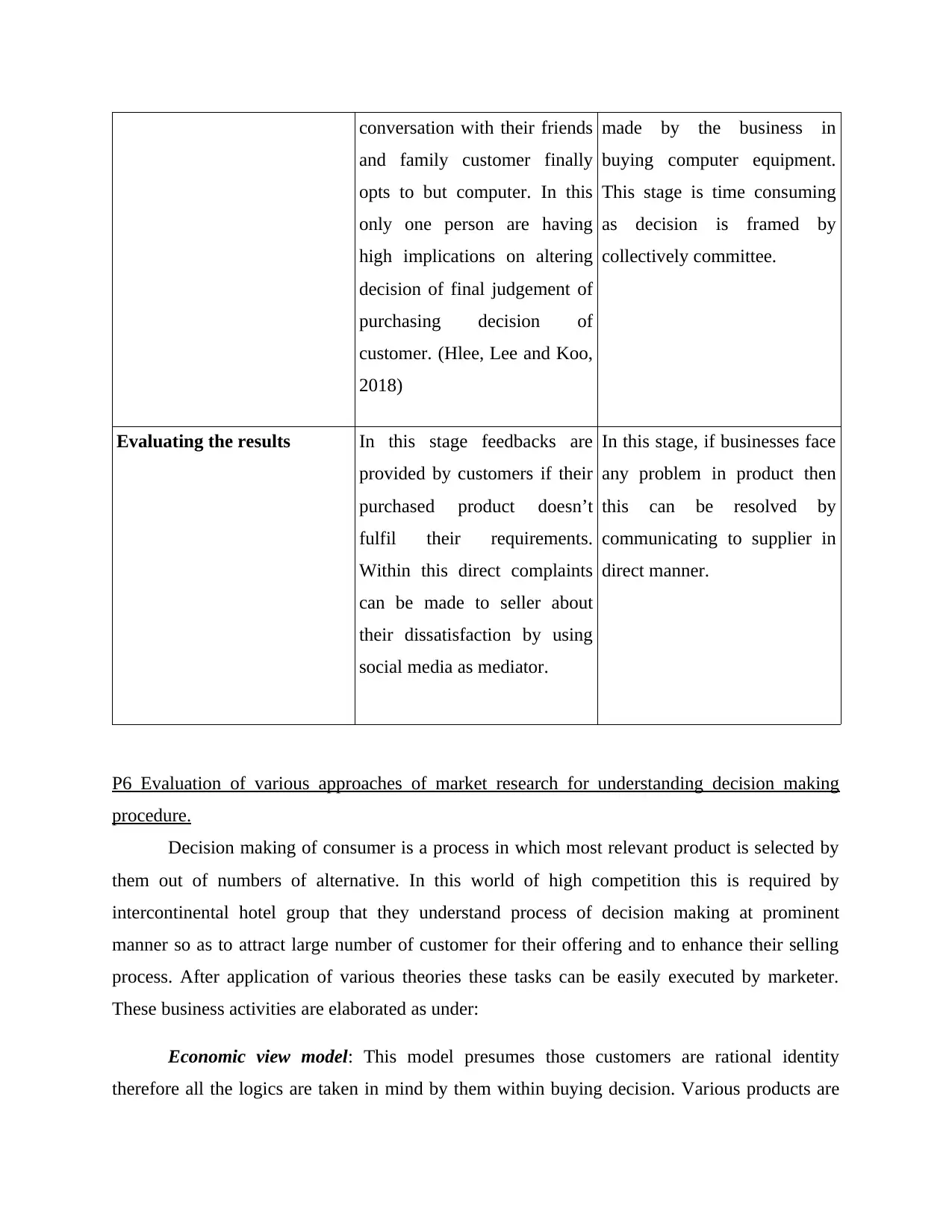
conversation with their friends
and family customer finally
opts to but computer. In this
only one person are having
high implications on altering
decision of final judgement of
purchasing decision of
customer. (Hlee, Lee and Koo,
2018)
made by the business in
buying computer equipment.
This stage is time consuming
as decision is framed by
collectively committee.
Evaluating the results In this stage feedbacks are
provided by customers if their
purchased product doesn’t
fulfil their requirements.
Within this direct complaints
can be made to seller about
their dissatisfaction by using
social media as mediator.
In this stage, if businesses face
any problem in product then
this can be resolved by
communicating to supplier in
direct manner.
P6 Evaluation of various approaches of market research for understanding decision making
procedure.
Decision making of consumer is a process in which most relevant product is selected by
them out of numbers of alternative. In this world of high competition this is required by
intercontinental hotel group that they understand process of decision making at prominent
manner so as to attract large number of customer for their offering and to enhance their selling
process. After application of various theories these tasks can be easily executed by marketer.
These business activities are elaborated as under:
Economic view model: This model presumes those customers are rational identity
therefore all the logics are taken in mind by them within buying decision. Various products are
and family customer finally
opts to but computer. In this
only one person are having
high implications on altering
decision of final judgement of
purchasing decision of
customer. (Hlee, Lee and Koo,
2018)
made by the business in
buying computer equipment.
This stage is time consuming
as decision is framed by
collectively committee.
Evaluating the results In this stage feedbacks are
provided by customers if their
purchased product doesn’t
fulfil their requirements.
Within this direct complaints
can be made to seller about
their dissatisfaction by using
social media as mediator.
In this stage, if businesses face
any problem in product then
this can be resolved by
communicating to supplier in
direct manner.
P6 Evaluation of various approaches of market research for understanding decision making
procedure.
Decision making of consumer is a process in which most relevant product is selected by
them out of numbers of alternative. In this world of high competition this is required by
intercontinental hotel group that they understand process of decision making at prominent
manner so as to attract large number of customer for their offering and to enhance their selling
process. After application of various theories these tasks can be easily executed by marketer.
These business activities are elaborated as under:
Economic view model: This model presumes those customers are rational identity
therefore all the logics are taken in mind by them within buying decision. Various products are
⊘ This is a preview!⊘
Do you want full access?
Subscribe today to unlock all pages.

Trusted by 1+ million students worldwide
1 out of 15
Related Documents
Your All-in-One AI-Powered Toolkit for Academic Success.
+13062052269
info@desklib.com
Available 24*7 on WhatsApp / Email
![[object Object]](/_next/static/media/star-bottom.7253800d.svg)
Unlock your academic potential
Copyright © 2020–2026 A2Z Services. All Rights Reserved. Developed and managed by ZUCOL.




